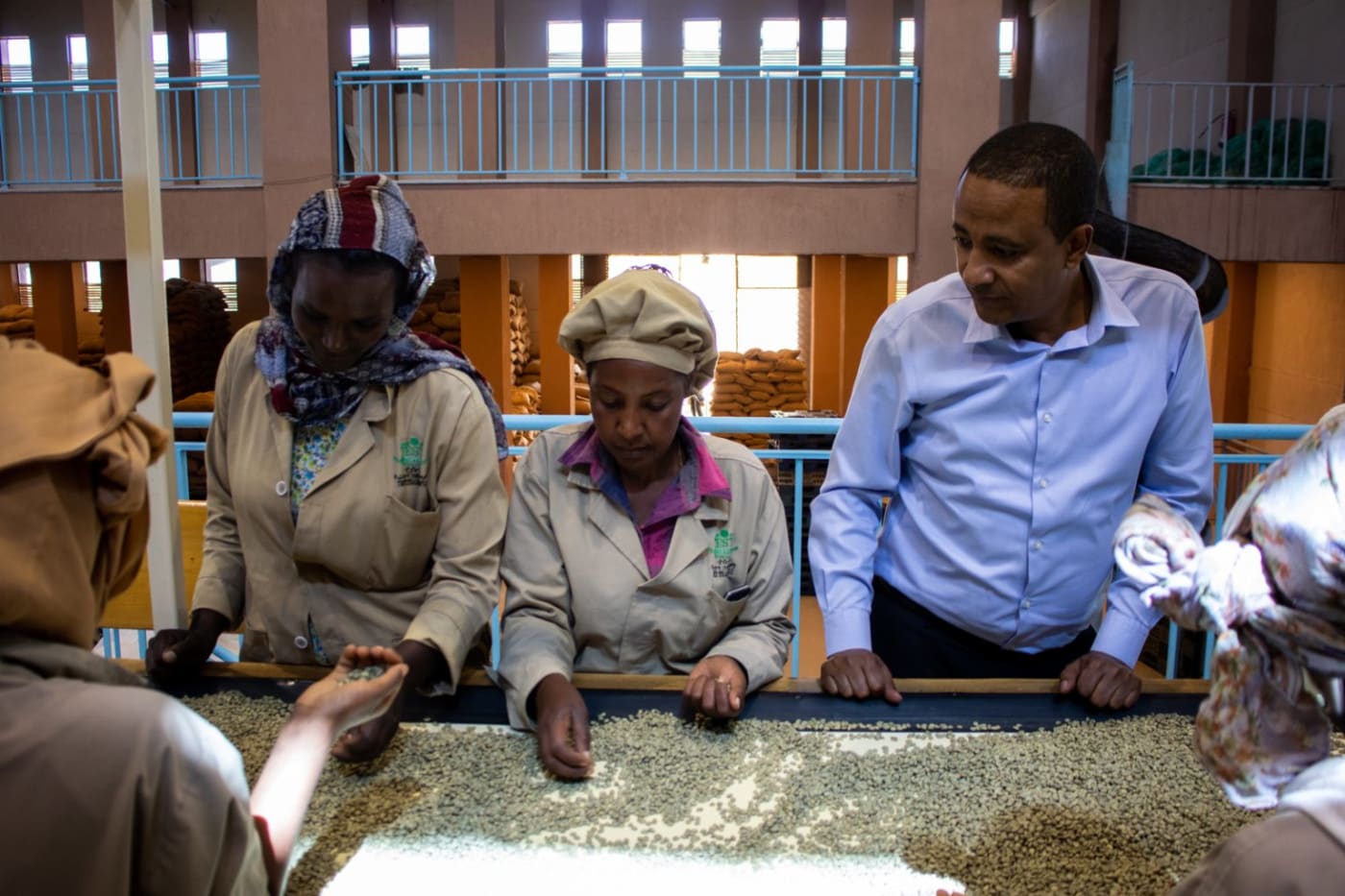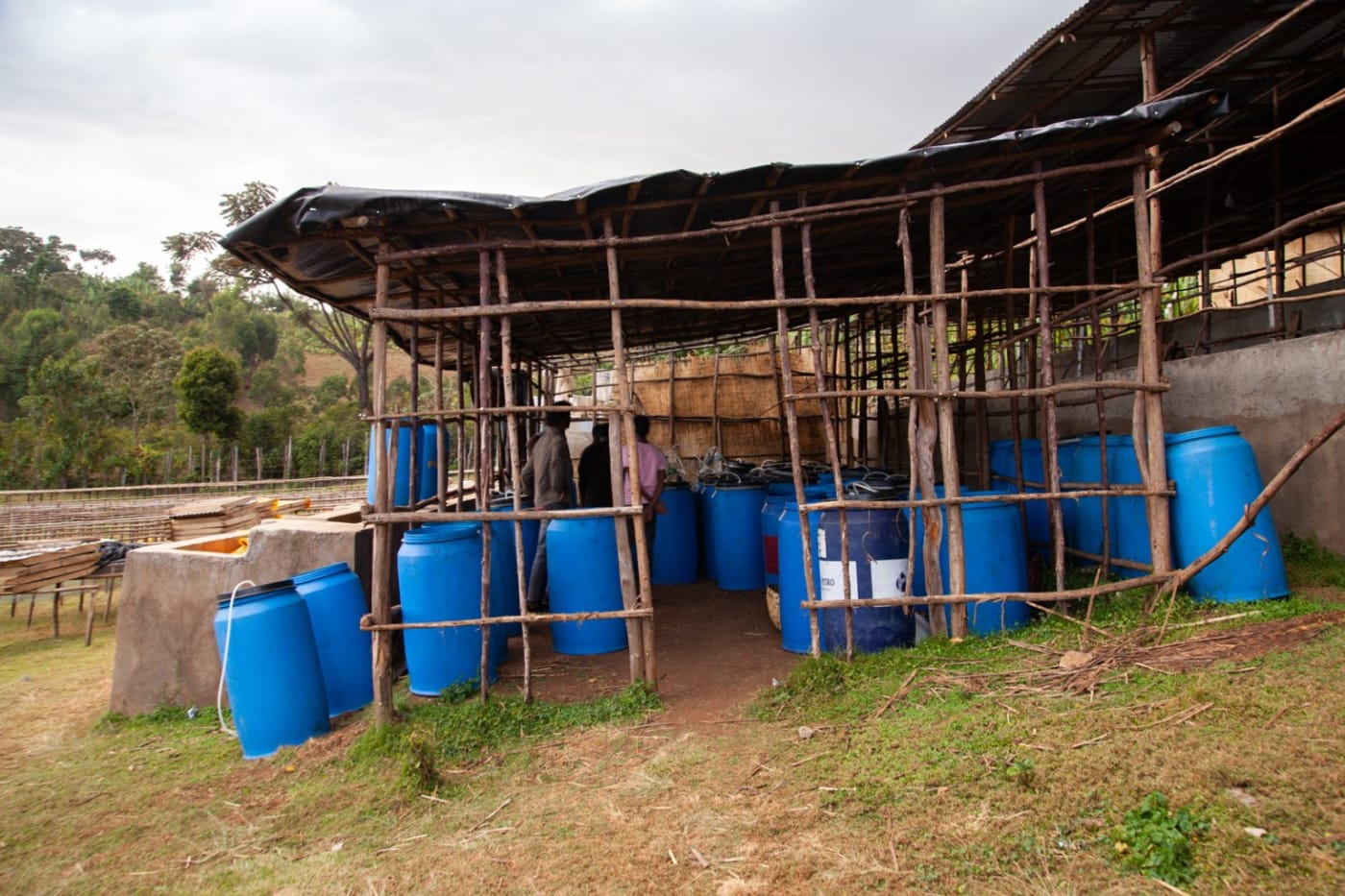-
Producer
-
10 Producers
-
Farm/Coop
-
Duwancho
-
Country
- Ethiopia
-
Region
-
Sidama
-
Altitude
-
1900-2150m above sea level
-
Variety
-
Process
-
Importer
-
Melbourne Coffee Merchants
-
Body
-
-
Acidity
-
-
Tasting notes
-
Yellow peach, apricot, elderflower, lemon myrtle
-
Roast style
Ethiopia
Duwancho
Washed PremiumThis is the first time we’ve featured the 74148, an Ethiopian Heirloom subvariety. This lot has grown at ~2000 masl and processed with meticulous care, brewing a complex cup where fruity flavours collide—we feel yellow peach, apricot, elderflower, and lemon myrtle.
Very Special
This lot features a brand new variety for us—an Ethiopian Heirloom catalogued by the Jimma Agricultural Research Centre (JARC) as 74148. In line with all its sister Ethiopian Heirlooms grown at high altitudes, it has a fruity and multi-layered flavour profile; we get so many flavours that we couldn’t even settle in our usual 3 descriptors, but 4! We forecast that different brewing methods will highlight some notes over others, so we can’t wait to brew a few and see how it goes.
If you need more than that to understand why this is in our VS category, there’s the exclusivity. We could only buy enough green coffee to supply our Brew Crew VS subscribers and maybe a few lucky retailers with what’s left.
So, to sum up, this lot is a complex, super high-quality, and exclusive coffee. Very Special!
Duwancho washing station
The washing station where this coffee was produced is located in the kebele (local village) of Duwancho, in the centre-south of Ethiopia.
Sitting at 2,250m above sea level, Duwancho produces exceptional washed, natural and special preparation lots. The site was built by Testi Coffee (a company that has produced many familiar coffees in our lineup!) in 2021 as a ‘premium’ facility for its natural advantages: high elevation, the surrounding region’s characteristics and access to fresh, clean water.

Mr Faysel, owner of Testi Coffee, at the dry mill
The producers
Most families that contribute to the site farm organically on tiny plots of land, averaging less than one hectare in size. Coffee is their main cash crop and grows alongside food crops of corn, grain and bananas under the shade of native Birbira, Wanza, and Acacia trees.
The 74148 variety
We’ll let the importers Melbourne Coffee Merchants talk a bit more about this variety, which, as we said, featured for the first time in our offerings:
“For many years, most Ethiopian coffees have been described as being a mix of cultivated and wild varieties, referred to as "heirloom varieties.” This is a term that is all-encompassing and used by many actors in the coffee industry to generally categorise Ethiopian coffee varieties that are from native forest origins. Whilst this describes many of the varieties found in Ethiopia, it is also a bit simplistic and does not acknowledge the varieties that are already locally recognised and cultivated, or those that have been specifically developed and widely distributed by the Jimma Agricultural Research Centre (JARC).
Sidama is home to many landrace varieties that were originally selected from the forest and have been propagated successfully for decades. There are five popular varieties that are named after indigenous trees in the area— Bedessa, Kudhumi, Mique, Sawe and Wolisho. There is little documentation on the history of these varieties, and it is hard to know if they represent a single plant or a wider group of varieties; however, it is widely accepted that they play a major role in the quality and floral flavour profile of the coffee from this region.
JARC varieties were developed using “mother trees” from Ethiopia’s coffee forests, and are now grown for disease and pest resistance, as well as exceptional cup profile, and are released by number. For example, 74110, 74112 and 74116 are all widely propagated in the Sidama growing region.“
This lot
This coffee lot was produced as part of Testi’s quality improvement initiative, Premium Cherry Selection (PCS). It is classified as Grade 1, the highest quality classification for Ethiopian coffees, indicating a great deal of effort has been put into selecting and grading during processing.
For this lot, carefully hand-picked coffee cherries were delivered to the Duwancho washing station, where they were carefully sorted, then pulped within 6-8 hours from picking and floated to select only the ripest and highest quality cherries.
Then, these went through a traditional Ethiopian washed method. The parchment-covered coffee is soaked in tanks of clean water from the local river Lugita, where it ferments for 48 hours. During this time, the water is replaced twice to ensure no spoilage occurs. This water also adds to the temperature stability of the fermentation, keeping it at an ambient 20.5–21.5˚C.
The beans are then dried on raised drying beds under a parabolic shade for up to 21 days, depending on weather conditions. During this time, the coffee is again sorted for defects and turned so it dries consistently. Finally, once it has reached the desired humidity, it’s rested, milled, packed and made ready for export.

The fermentation storage area
Learn everything about this coffee:
Ethical, traceable sourcing
This page has all the sourcing information (variety, process, region, story, importer, and more) that our importers share with us, and give us permission to use.
The transparency helps us talk confidently about the quality and background of our product, and it helps you know exactly what you’re buying.
Learn more:
Coffee page transparency legend
Our coffee philosophy
Our business approach
Fresh harvest coffee
We only source and roast coffee from each country’s latest harvest season (so the green coffee is never older than 1 year from the time of picking, processing and packing). This ensures the sensory qualities are always at their peak and unaffected by excessive ageing.
Roasted for espresso and filter (best enjoyed black)
Roast style: omni. Omni roasts are designed to brew and taste great both as espresso and filter. Our omni single origins generally sit on Agtron values in the ~70-60 value range. So, technically, they are somewhere in the lighter side of the medium spectrum.
Designed for espresso and filter brewing. Best enjoyed black.
Learn more:
Our Loring Kestrel S35 roaster
Our roasting style and approach
Best brewed within days 15-49 post-roast
The ‘fresh is best’ saying doesn’t apply to coffee (contrary to popular belief). Waiting before opening and brewing your bag of whole coffee beans helps develop peak flavour and acidity.
But heads up: if you buy pre-ground coffee, brew it as soon as possible.
Learn more:
Our recommended brewing window
Try our custom brewing recipes
Our recipes and ratios are tailored to our coffee sourcing and roasting styles, bringing the best flavour and feel out of each coffee.
For pour over, immersion, and other filter brewing styles, check our brew guides.
For our espresso single origins, we recommend a coffee:yield ratio of 1:3:
- Dose: 20g ground coffee
- Yield: 60g espresso
- Total brew time: ~24-28 seconds
This is just a starting point! We encourage you to experiment, taste, and adjust to find the recipe that you enjoy the most.
Learn more:
Our espresso brew guide (single origin)
Brewing ratio calculator
Packaging and sustainability
- Bags: ABA-certified home compostable (AS 5810-2010)
- Labels: recyclable
- Valves (only on +250g bags): general waste
- Box and tape (online orders): recyclable
Learn more:
Our packaging
Variety
74148 variety
An Ethiopian Heirloom subvariety developed and catalogued by the Jimma Agricultural Research Centre (JARC).
The location
Coffee from Ethiopia
Seen as the birthplace of domesticated coffee, there are not many more exciting times at the Sample warehouse as when our fresh Ethiopian lots arrive. Legend says it’s our favourite origin…
The Sidamo region of Ethiopia
Both ‘Sidamo’ and ‘Sidama’ can be used to describe coffees from this region, Sidama refers to the locals of the area. It grows some of the highest coffees in Ethiopia
Farm processes
Washed process
Machines are used to remove the flesh from the coffee cherry before being fermented in water, washed again, and finally sun dried. This process tends to result in more distinct, cleaner flavours.

Subscribe to a world of coffee
Discover a new single origin coffee from Sample every 1-5 weeks with no delivery fees.
No up-front purchase, and you can pause, cancel, or change plans at any time.
Available to order online this week:

Kenya Karimikui
Flavours of blood orange, blackberry, plum jam
Body Acidity
Washed Batian, SL28, SL34, Ruiru 11
November 2024 harvest
Roasted omni for filter and espresso
Kenya Karimikui online
Ethiopia Tadese Teko
Flavours of bergamot, mandarin, mango
Body Acidity
Washed Ethiopian Heirloom
January 2025 harvest
Roasted omni for filter and espresso
Ethiopia Tadese Teko online
Rwanda Kibirizi
Flavours of mandarin, raisin, apple
Body Acidity
Washed Bourbon
June 2025 harvest
Roasted omni for filter and espresso
Rwanda Kibirizi online
Mexico Isavel Lopez Pablo
Flavours of sugarcane, dried cranberry, white peach
Body Acidity
Washed Typica
April 2025 harvest
Roasted omni for filter and espresso
Mexico Isavel Lopez Pablo online